Friday, 9 September 2011
Movie: Red State - Kevin Smith (2011)
Red State is a heraldic term for neonate American conservatism. Words that provoked such strong emotion just a few cold war decades ago, now have a re-imagined, end-of-days motif. It's also a calling-card embossed with a distinctly Aramaic font, perhaps with a Jesus logo in one corner, earnestly cradling an AK.
But this is a film as much about polarity as it is fundamentalism. You could argue that religious extremists are far easier to stomach in your own backyard. It might also be mooted that scripture-bending Svengali types such as Abin Cooper (played convincingly by Michael Parks) are fewer upon the earth these days, but that might largely depend where you take your holidays. Needless to say, writer/director Kevin Smith decided there was enough in the Wacometer for one more shot, and Red State - it has to be said - has a pretty good tilt at it.
The action is set-up briskly and without preamble, auguring well for pace. As a student of screenplay and bit of an all-round dick, I tend to pause the movie and time these things. Setup to plot point one? Usually ten pages, give or take. This does it in six, which is beautifully lean, but that's the trouble with script mechanics. Layers of deadening conceptualisation, befuddling the core of truth with their man-made imperatives. Did I say script mechanics? I did, of course, mean Christianity. (Or much of mainstream religion, for that matter)
What's nice about that early tempo is that it doesn't give you time to get comfy. No mote as such to discern in your brother's eye, mainly because it's too busy being 'sploded by semi-automatic weapon fire. One thing we do know: it's going to get much creepier and that's kind of all good too, because we don't yet care enough for any of the characters.
Which, as the action becomes more sedate and story threads converge like god-botherers on a doorstep, leads us irresistibly to another question - probably one only a Syd-Field-reading, know-nothing dickhead like me would ask. "Is there a clearly-identified protagonist?" Well no, not really. I mean, in a 'pick a card, any card' sense, yeah - but here's the thing: they're all really kind of assholes too, in their own flawed way (and I don't mean flawed as in endearing).
I mean, it's nice to see the juxtaposition of contemporary catch-all terrorism laws lending gusto to an already gustatonic governmental wrecking krew (spearheaded by a svelte-looking John Goodman, who seems not quite conflicted enough to buck too many trends). It's also nice to see third-generation cult-kiddy, Cheyenne (Kerry Bishe) taking a stand for the middle path. It's even good that one-third of the original pubescent line-up Jared (Kyle Gallner) gets a late clarion-call for Unlikeliest Eleventh-Hour Root-boy in a Motion Picture. Collectively, their plights are monstrous and compelling, but individually, they don't have the viewer clutching strenuously enough at their rosaries for my money.
I mean, such script confusion can easily be cleared up with a dismissive "Learn the rules so you can break 'em, sonny" from Mr. Smith, and I'd take that. Because, for all the tortuous, last-third fiddles (I can only imagine how many drafts the last twenty pages of this screenplay went through) the film is in-your-face and snappy enough to drive the story, as Poe says, 'relentlessly to its conclusion.'
Whether you think that conclusion is satisfying enough is for you to decide. To forgive, after all, is divine.
Much has variously been mentioned of the movie's marketing and distribution methods. If you want to watch movies the way film-makers intended you to, this is a great way to start.
Four stars out of Five.
View this movie on demand by visiting the Website. Don't forget Kevin Smith's SMODCAST pages either. Easily the best free entertainment on the internet.
Tuesday, 22 June 2010
Book (Fiction) - A Dark Matter, Peter Straub.
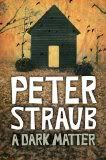 |
| Buy On Amazon UK |
Peter Straub writes about a ritual in a meadow one evening in the 60s, during which four high school friends share a different perspective on the same occult happening that affects them deeply for the rest of their lives. Years later, the husband of one of the participants, Lee Harwood, decides to piece together those same events from the viewpoints of the parties concerned. In fact, Harwood belonged to that same high school bunch, but failed to be drawn by the instigator of their apocalyptic experience, ageing campus guru Spencer Mallon. He has always wondered about that day, knowing the others have a bond as a result that he isn't privy to, but also aware that were some dire consequences, resulting in the death of one of their number and lifelong internment in a mental facility for another. This subliminal questing is brought into focus, years later, by an encounter with a raving man in a diner, who reminds him of the one who didn't fare too well from his experience.
The principal characters have no weaknesses of construction, they are as whole and hale as he crafts them. As always with Straub, less is generally more, except perhaps in the case of Spencer Mallon, that purveyor of cod philosophy - "everything is everything", and shabby necromancy. His Svengali-like hold over the impressionable students does not invite unbelief, but his later propensity to dally through layers of time and space at will, concocting Lost type challenges for hapless followers in search of truths does, a little. Mallon, in the way of superhero villains, is over-powered, threatening the credibility of the otherwise elaborate small-townness of Straub's world.
Straub, it seems, became conscious of this, and also the need to allow the intended viewpoints (of the now-grown students) to flower and so prunes back Mallon's latter-day character, confining him largely to hints and half-glimpses and reported speech, with one physical airport appearance (to warn Harwood of an impending disaster).
But this clunky watering down leaves the unlikeable Mallon stranded two-dimensionally in the current world. Brimming with inarguable potency, yet too far removed from the consequences of the story. It's a tricky balance that Straub marginally struggles with in the late stage pregnancy of the story's often painful birth.
So the narrative works best when these grown-up folk struggle to reconcile what happened to them that long-ago day, encouraged by Lee Harwell's gentle probing. Having said that, this isn't a leap out, scream-in-the-dark horror parable in the way of King or Herbert. Straub doesn't write that way, he builds a sense of strangeness in the inanimate, almost inviting you to wander through scenes of the everyday and point out things that mightn't look quite right. That mightn't be what they seem. All without judgement or inference, and with that shrewd air of "we're just going here, to take a look. Come along if you want."
Unusually though, for someone so effortless in the art of story, the first fifty pages were fairly hard going, as though the author had struggled through several drafts to try and make his world stick, and had deemed this the best it was going to get. After that, though, Straub's laconic style soon kicks into stride, economy and turn of phrase dictating a smoothly deceptive pace and level of engagement common to all his works.
In summary, this isn't his absolute best. It falters at times and wanders into areas of dislocation at others, but it still offers that same sleepy warmth of a long, disturbing daydream in a summer meadow.
Rating: 3 stars out of 5
Thursday, 10 June 2010
Book (Fiction) - A Life of Pi. Yann Martel
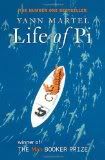 |
| Buy From Amazon. |
Rating: 4 stars out of 5.
This is Yann Martel's second novel, which concerns a young Indian boy's ordeal of 227 days aboard a lifeboat, with just a 450-pound Bengal tiger for company.
In its deepest essence, Life of Pi seeks to tell a story. Whether tall tale or epic survivalist journey is up to you to decide. At its conclusion, Martel will actually challenge you to do so. But because story is at its focus and telling it is the point, the metaphysical stuff, the allegorical matter, the Zoo parable, the magic realism slinks moodily alongside, like that striped carnivore behind the mind's own high fence. It probably defies outright categorisation for this reason, albeit it not sufficiently enough to prevent it from winning the Man Booker prize in 2002.
The tale follows the struggle of bookish, dreamy Piscine Patel, who truncates his own name to Pi. There are good reasons for this, and they come from early school taunts like 'Pissing' Patel,. In deflecting this routine mockery by aligning himself with that mathematical constant, Martel illustrates his protagonist's cunning.
And so, in that Greek letter that looks like a shack with a corrugated tin roof, in that elusive, irrational number with which scientists try to understand the universe, I found refuge.Similarly, in his embracing of Islam, Christianity and Hinduism, with visits to all three purveyors of those sideshows, Martel demonstrates Pi's objectivism. Not that he is some sage, spiritual everyman; merely that he finds different attractions in all three. This marks out some of the adolescent naivete that will plot his course on a bobbing vessel in the vast Pacific ocean. He doesn't quite grasp the human need to adopt a position, be it football team, politics or religion, and cling to it no matter what, and it is potentially this investment in the possible that will ultimately save him. When a chance meeting of those three belief systems meet, in the market place, with his parents present, the sparks that fly are surprising to him.
"What it comes down to," the priest put out with cool rage, "is whether Piscine wants real religion or - myths from a cartoon strip."
"Gods - or idols," intoned the imam gravely.
"Our gods - or colonial gods," hissed the pandit.
It was hard to tell whose face was more inflamed. It looked as if they might come to blows.
So you understand the build-up to characterise Pi Patel as a recessive tool of whimsy is necessary for the suspension of disbelief that follows. And it's a big suspension, a huge disbelief.
Nonetheless, the facts are catered for, to soften us. Pi's father ran a zoo in Pondicherry, so Pi has experience with animals, or perhaps more importantly, the psychology of animals. Or perhaps crucially, the psychology of animals in captivity. If this lets you believe this boy can share a narrow space (twenty-six feet, from bow to stern to be exact) with a tiger called Richard Parker, then the job is done. The belief that people can resort to any manner of survival processes, including eating human flesh and animal dung...
Richard Parker's anus distended and out of it, like a bubble-gum balloon, came a black sphere of excrement. It fell into my cup with a clink, and no doubt I will be considered to have abandoned the last vestiges of humanness..when I say that it sounded to my ears like the music of a five-rupee coin dropped into a beggar's cup.
...is less problematic. There are more than enough examples of these, true and false, to fuel an entire street of urban myths.
Pi will find out where god really is in the course of his journey and perhaps you will too. His tale is both endearingly simple and staggeringly complex, but the pleasure is in reaching a summit we already know is conquerable, that Martel at the outset tells us, in fact, has a 'happy ending'.
Yann Martel's new novel is called Beatrice and Virgil and is available from bookstores now. Alternatively, you can click the Amazon link below.
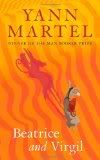
Monday, 7 June 2010
Game - Red Dead Redemption. Rockstar Games.
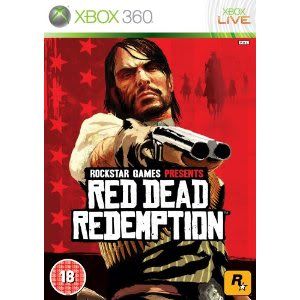 |
| Buy On Amazon. |
All the best games tap into the spirit of something and distil a quintessence of it that the collective psyche can sharpen its teeth on. A mighty unenviable task, you might imagine - to anticipate what a generation is thinking and build a hopeful empire around it. But that's what games used to do routinely. And it's not that mighty if you're God. Not too unenviable if you're Rockstar.
What do I mean? Well, how many of you have thought about growing your own veg lately? How about a herb garden, all legal like? A fruit tree or two? (or four, in my case). Fancied seeing a few chickens running around giving authentic soundbites to your sunny side ups?
Well sure, Roger Recession has had a hand in that. But we're all seeing the bigger picture coming into focus here; we're not daft. It's painted in the dying cries of corporate Stegosaurs, who, like their prehistoric parallels, grew to a super-sized mass but whose actual brains got no bigger, at the mortal cost of mobility. It's there too, line-drawn in the gluttony that concretised our cities, and that hinges now on a law of defaults and diminishing returns. The last crumbs of these slobber, as we speak, on the chins of feudal barons, who are managing to appear both servile and hateful as they beg for their livelihoods, promising greater restraint the way a crack addict does to a loved one between highs, or the way an oil company does to a government, while slurping up the last dregs of fossilised goo from the sea bed. Anxious, in the last days of its extinction, to waste not a drop, even if it means taking the world down with it.
We know this organically, instinctively, as one. We are already thinking obscurely of what it feels to live off the land, as our forefathers once did. We are certainly no happier, historians tell us, than they. Their hardships yielded leanness, backbone and long life, our plenitude brings obesity, back pain and early death. Some of us have already pulled soundlessly away from the urban herd and corralled ourselves onto rural plains, eschewing wealth. Growing produce. Keeping bees. Geocaching.
For those of you who haven't, here's a vehicle to act out that dream, pulling up alongside about now, a swarthy stranger at the reins. "Step inside, friend. Name's John Marston."
 |
| 'Taxi for Sundance?' |
Nevertheless, and to summarise a lengthy opening (that has said precisely zip about the gameplay yet, sorry) it seems that a mixture of foresight, digital largesse and geopolitical luck delineates certain games as classics. The sort that Deus Ex had, perhaps, or Half-Life. Self-aware riffs on the sum of all fears, exploring them up to and including their logical conclusion. But by taking off some of the rails and putting us at the helm of decision-making, they do so with an equal chance of compassion or dictatorship. And if you mess up, well that's your fault, pardner. Off the back of that acceptable trade, many games today offer the same choice. Fallout 3 does to perfection. Oblivion does, GTA4 does, and Red Dead Redemption does too, because control isn't necessarily just about where you point your spaceship any more.
So Red Dead's additional edge could well lie within the era it represents, a place of history we know is already gone, but one that we perhaps yearn obscurely for. We are, after all, the ultimate 'cake and eat it' generation; taught self-indulgence by parents who gave everything. But what have we missed out on, really - apart from going to war? What can they have possibly kept from us? Because this modern day stuff isn't all that. We've been there, Rockstar - haven't we? - and done that. Another contemporary city to play out a shallow turf war on would have been so passe and they knew it. They're not daft either.
So it's natural to begin with that same romantic view of the West that undoubtedly captivated its pioneers. Casual violence, rape, arson and cattle rustling are but ticks on a horse's hide, a dim awareness that someone, somewhere is getting their arse bitten, but not you, not yet. So you shade your eyes against the hot sun and admire, no - soak up - the view. It's still early days though, and no matter how much you love the vast, arid landscape of desert, punctuated by railroad, monolithic rock and dirt trail, your modern mind can't reference the empty spaces, and tries to fill them with skyscrapers and traffic lights. Coffee shops and Taco Bells.
 |
| Grab your theodolite, Marvin, I've found just the spot. |
In that cactus-filled gulch, where the bleached skulls of cattle gather is the perfect symbolic spot for a Macdonalds drive-thru, you think, then feel a bit sad about it. This isn't Sim City, you tit. But through some foible of the mind or similarity of game engine there's an afterimage of GTA4 you can't quite blink away, some clingy zeitgeist that needs to soften the desolation with its own superimpose-o-vision. You soon get over it, though, eventually, realising it's probably the lamentable ego crying for its mummy, just like it did when you first detached from the reptile. The last bits of dummy it spat when you gave up BUPA and Costco and the sanctuary of salary. You can never go back, it insists. But you can. You must.
You've an impressive physical scar or two, the sort that might have been symbolised in your other life by redundancy or repossession. A loved one's addiction to tanning booths and iPhones perhaps taking them into the arms of another, more capable supplier. You have known trauma then, but not outright ruin. You have seen hardships, but not starvation. You are self-serving, but altruistic. And so is John Marston.
You are struck by this unexpected resonance, convinced it can't just be coincidence. This has to be an extension of the way your life is unfolding of late, a prophecy of instruction. It nags at you, like deja vu, while you familiarise yourself with your horse, liking the way his flanks ripple and hamstrings tauten as you ride, gently at first, then the glisten and swell of his hide as you guide him - growing quietly confident - with flicks of the wrist, digging your bootheels to ramp up that easy trot into a clompy gallop. Let's see what you've got, Shergar. Then, a spur too far and he throws you off, and in that momentary dust-cloud of rage you draw your gun and shoot him right in his stupid head, then skin him, the tetchy hoofed cunt. No part of the animal is wasted; you can even sell his meat for profit. So once it dawns on you that all this teeming wildlife represents bunce and bounty, the romance kicks up a notch, albeit firmly into Tarantino territory, more steampunk than showboat. Hello, human nature. You took your time.
So your ride is dead and you're in the middle of nowhere but no matter, there's plenty of wild horses to be tamed and even a lasso to do it with, once you progress a little.
 |
| Must remember to keep hold of the rope this time. |
John, you find, is even more like you than you ever hoped or imagined. Time after time the bullets fly and the rabbit or the skunk or the deer or the crow or the dog or the chicken or the showgirl (oops, sorry Ma'am, done thought your boa was a real-life constrictor) fall down impressively, (the new Euphoria engine really showcases its talent here) for you to pluck bare, leaving no end of skinned cadavers shivering and fly-blown on the dusty plain. "Lie still," John says, as his knife splodges blood on the screen. And that's exactly what you'd have said too, with just the right touch of irony in the chuckle. You are soulmates and your journey together, you absolutely know for a fact, is going to be special.
And from here on in, the game never loses that quaint, almost somnolent vibe. Not in the cut scenes, which are tight and cinematic, not in the fights you are called on to break up, the honour of whores you are required to defend with unfailing regularity, the storekeepers' funds you are implored to reappropriate and offenders to vanquish, the various wild beasts you are compelled to fight off, most of which are completely fixated on the job of disembowelling your horse.
 |
| Cougars and rattlers and bears - oh my! |
All of this is underpinned by a swoony feel of High Plains Drifter meets Back to the Future III that you never once want to buy out of, especially when you enter Mexico and the haunting music rises with the hoofbeats, putting you more firmly in the saddle of a Sergio Leone movie score. It is achingly good. They've obviously watched a ton of westerns in the course of making this, and, if it doesn't exactly provide you with the catharsis you first anticipated (or had wistfully bestowed upon it) there's one thing that playing Red Dead leaves behind in your waking life, and that's the urge to watch a good western. Silverado, maybe, or The Good the Bad and the Ugly. Actually, I did watch that last one and it's shit.
Any issues that may have tainted the flow of GTA4 and its offshoots have been winkled out and refined to perfection. Whilst the shirt on its back is manifestly of GTA cheesecloth, it's had a good biological washboarding under a mountain stream, and all its creases ironed out through the mangle, which is nice. Not too many names on the map to shuttle between like human tumbleweed, so sets of missions tend to be grouped manageably between characters. Sub-quests from strangers neatly arrayed with progress bars, available through the menus. Sub games such as Liars Dice and Horseshoe all throwing some welcome gunslinger R&R into the mix. Texas Hold Em Poker is a particular fluid and addictive hook, with all the usual wry and repetitive soundbites we come to expect from the Rockstar NPC. "I saw mah boss - kiss a man!"
Other dalliances are there to take up your time, such as searching for scraps of outfits to wear when you piece them up, or the ubiquitous bounty hunt. Then, after you gain the lasso, a-wrangling we will go, hogtieing varmints and vagabonds alike, for extra 'alive' bounty cash. Sometimes a stranger accosts you for a shooting contest (as if you hadn't randomly slaughtered enough birds that day). Or he might simply take a dislike to your pissant face and challenge you to a duel.
So despite the distances between places and the lack of architectural features to fill them, (compared to, say, San Andreas or Vice City) there's never anything less than the feeling of an organic world, thriving studiously under the desert sun. There's an even greater sense of it in multiplayer, which offers a whole other picnic of 'free roam' within the game environment. With co-op missions and competitive missions such as Gold Rush and Grab the Bag, these are party games for the big kids, worthy of a separate review in themselves.
 |
| Paint your wagon. With lead. |
There are far more save opportunities now too. A property to rent or buy in every town, but even better - a camp you can buy and set up in the wilderness, where you can not only save your game and change your outfit but fast travel to a location of your choice. Checkpoints in missions so you don't have to start right from the beginning again. Keeping hold of your weapons and provisions once you die, thereby not penalising too heavily by simply putting you back at the last save point, essentially intact. The levelling up stuff and all the sub-games are a nice, highly-polished touch too.
There are some niggles though, as might be expected with a game of this sheer size and scope. Frame rate issues in places, random things disappearing from the screen. One mission bug had me trying to corral a herd of cattle into an enclosure whose gates steadfastly refused to open, another saw my body cartwheel around the hitching post every time I tried to secure my horse. But they are not gamebreakers, and the simplicity of restarting mid-mission eases the penury somewhat.
Overall, GTA4 with cowboy boots on, it may well be. But this game embodies all the spirit and fun of line dancing with none of the shame, unless, of course, you just shot your horse through the neck trying to down songbirds again.
Rating: 5 stars out of 5.
.
Sunday, 6 June 2010
Play - When Harry Met Sally - Opera House, Manchester.
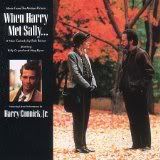 |
| Original Soundtrack - Buy from Amazon |
Saturday May 15th, 2010.
This stage revival of writer Nora Ephron’s 1989 movie classic is directed by Michael Gyngell, whose previous credits include (as Associate Director) Olivier Award-winning The Play What I Wrote. Sally is played by ex-Hollyoaks star Sarah Jayne Dunn, whose stage work encompasses the comedy Boeing-Boeing and The Vagina Monologues. Harry’s role is taken by Rupert Hill, no stranger to TV audiences as Mike Baldwin’s son Jamie in Coronation Street. He has built up a body of stage work too, most recently as Adrian in Deceptions. Supporting roles come from RSC actor Luke Rutherford as Jack, and Kosha Engler as Marie. American-born Engler was nominated for Best Actress in the 2009 MEN theatre awards for her portrayal of Carol in David Mamet’s Oleanna at the Bolton Octagon. The cast is completed by Callum McArdle (Joe/Ira) who is a graduate of the Guildford School of Acting and Annabelle Brown (Helen) an accomplished singer soloist and actor, appearing most recently in A Christmas Carol at the King’s Head (Mokitagrit).
Music comes from celebrated brothers Ben and Jamie Cullum with lighting and sets from Ben Cracknell and Tim McQuillen-Wright respectively.
This production marks a recent trend in translating big-screen classics to the stage, beginning with a West End production of The Shawshank Redemption last year and with Fatal Attraction rumoured for a theatre showing late in 2010. It is not difficult to see why this has been a straightforward choice for a similar treatment. The adaptor of Ephron’s original work for the stage, Marcy Kahan, in her programme espousal, quotes playwright Christopher Hampton’s definition of a theatre play as: “The slow unfurling of a tightly knit argument, powered by rhetoric, while a screenplay relies on the eloquence of its images.” The spoken word primarily drives this as a drama, she argues, and that’s why, “in its deepest impulses, it is really a stage play.”
No argument there, but how to convey to a theatre audience those iconic performances by Billy Crystal and Meg Ryan that will surely overshadow any well-meant re-enactment?
For those who have recently emerged from cryogenic stasis or are unfamiliar with the story, When Harry Met Sally spans a dozen years as two New Yorkers weave sporadically in and out of each others’ lives with a different aspect on their relationship each time they do. It takes place throughout the yuppie decade of the 1990s, culminating at the millennial eve of 1999.
The action is played out on a simple, multi-level stage with a backdrop image of the New York skyline. Set and costume changes are crisp and unobtrusive, driving the story forward with fluency and confidence.
As with the original film, the play’s success hinges on the chemistry between the leading pair. This will determine whether the audience believes their journey, from Harry’s disavowal of Sally’s belief that ‘men and women can be friends’ to the conclusion of that truth in a way that satisfies expectations of both genders. Hill and Dunn’s performance achieves that by some measure (with Hill’s New ‘Yoik’ brogue impeccably maintained) but the supporting roles of Jack and Marie add a considerable amount too, bolstering the process with their engaging portrayal of the ‘happy couple’, hitting it off, by contrast, entirely without complication.
From a script of this quality, sparkling with impish wit and cutting observation, the actors could almost be forgiven for ‘phoning in’ their performances. Happily, that isn’t a temptation succumbed to by any of the cast here. Even the relatively limited roles of Brown (Helen) and McArdle (Joe/Ira) are polished and fulsome. For the audience, laughs and spontaneous applause are never far away, particularly after Sarah-Jane Dunn’s expertly comic-timed orgasm-faking in ‘that’ scene. But the overall experience is so much more than that, capturing the same feel-good quality of the movie that lasts long after we’ve ‘had some of what she’s having’.
Subscribe to:
Posts (Atom)
Amazon Search
About Me

- Tony Foster
- Manchester, England, United Kingdom
- Writer, Father, student, career procrastinator.




